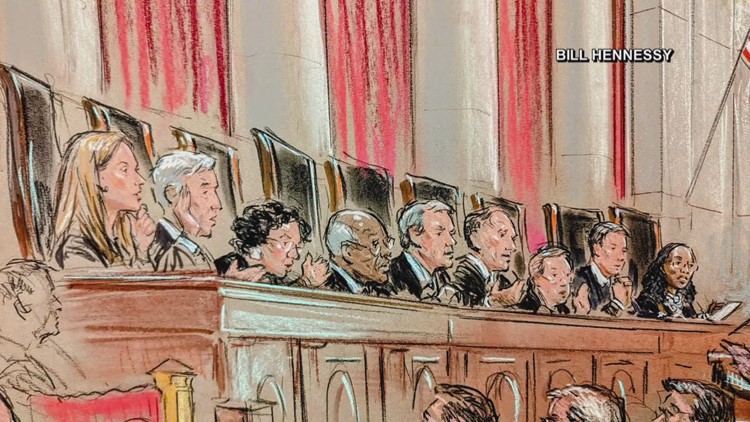[ad_1]

The country’s highest court sided with former President Donald Trump to keep him on Colorado’s presidential primary ballot.
WASHINGTON D.C., DC — The U.S. Supreme Court on Monday sided with former President Donald Trump, allowing him to stay on the primary ballot in Colorado – despite a challenge from several voters who argued that the former president was ineligible because he was involved in an insurrection.
The ruling was made after the court heard oral arguments from both sides on Feb. 8.
In September, the liberal group Citizens for Responsibility and Ethics in Washington (CREW), along with four Colorado Republicans and two unaffiliated voters, sued to disqualify Trump from the Colorado primary ballot, based on Section 3 of the 14th Amendment of the U.S. Constitution.
Norma Anderson, 91, is the lead plaintiff in the case.
The nation’s highest court agreed to review the first-of-its-kind court ruling after Colorado’s Supreme Court justices ruled 4-3 in December that Trump should be disqualified from the primary ballot under Section 3 of the 14th Amendment.
Section 3 is a clause that bars people from holding office who have taken an oath to support the Constitution and “engaged in insurrection or rebellion” against the Constitution. It was created to prevent former Confederates from returning to government positions.
Colorado’s highest court affirmed a lower court’s ruling that there was an insurrection in Washington D.C. on Jan 6, 2021, that Donald Trump participated in it, that his incitement of insurrection was not free speech, and that the 14th Amendment applies to the president.
Johnathan Mitchell, who represented Trump, argued to the Supreme Court in February that Trump, as president, was not an “officer of the United States.”
“Officer of the United States refers only to appointed officials, and it does not encompass elected officials such as the president or members of Congress,” Mitchell said during oral arguments. “The president doesn’t commission himself, and he can’t commission himself.”
Jason Murray, who represented the Colorado voters who brought the case, argued that based on discussions in Congress at the time the 14th Amendment was debated and enacted, it was understood that the presidency and vice presidency were included.
He argued that the spirit of Section 3 was to prevent charismatic former Confederates from rising in power, up to and including the presidency. He specifically mentioned that Jefferson Davis, who was president of the Confederacy, was in the mind of Congress as it was considering Section 3.
SUGGESTED VIDEOS: Politics
[ad_2]
Source link







